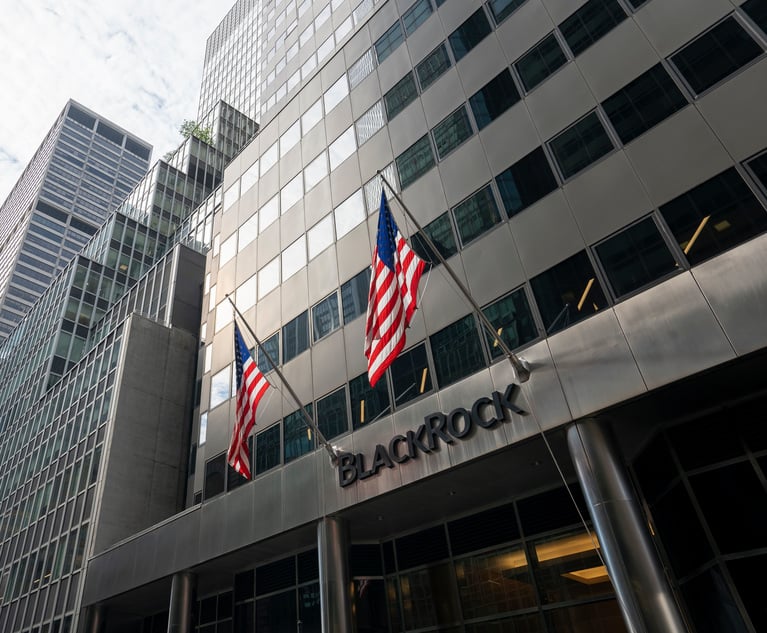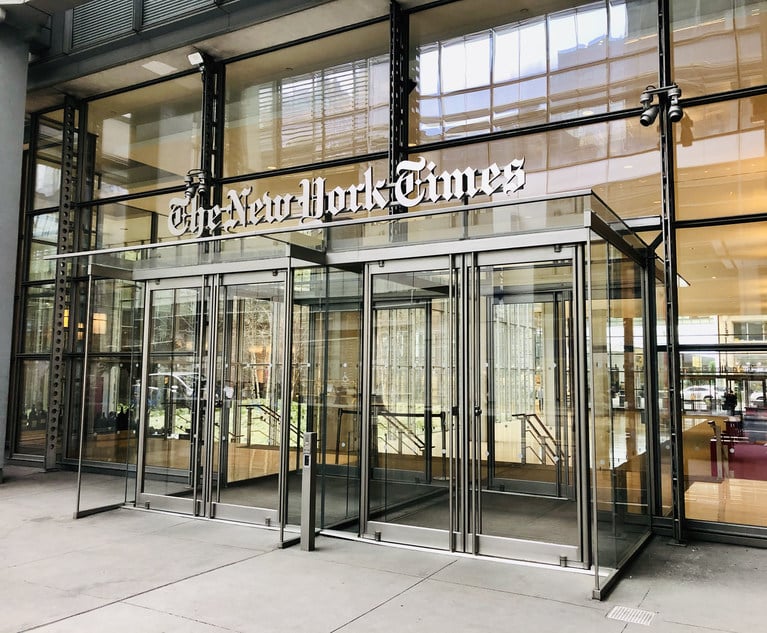 U.S. District Judge Dabney Friedrich in July 2017 at her confirmation hearing in the Senate Judiciary Committee. Credit: Diego M. Radzinschi / ALM
U.S. District Judge Dabney Friedrich in July 2017 at her confirmation hearing in the Senate Judiciary Committee. Credit: Diego M. Radzinschi / ALMDC Judge Tees Up Proof Questions in Mueller's Russian Troll Farm Case
“I'll give you, Mr. Dubelier, that this is an unprecedented case,” U.S. District Judge Dabney Friedrich in Washington said Monday, addressing the Reed Smith partner representing Concord Management and Consulting in a Mueller case.
October 15, 2018 at 01:35 PM
5 minute read
A federal judge in Washington raised questions Monday about how prosecutors working with Special Counsel Robert Mueller III will be able to prove a key element of their case over Russian interference in the 2016 election: the alleged intent of 13 Russian nationals and three Moscow-linked firms to evade U.S. authorities tasked with rooting out foreign participation in the American political process.
U.S. District Judge Dabney Friedrich, confirmed in November 2017 to Washington's federal district court, said it was “hard to see” how the alleged Russian influence campaign was intended to interfere with the operations of the U.S. government rather than simply “confusing voters.”
Friedrich's comment came as special counsel prosecutors defended their case amid a challenge brought by one of the defendants, Concord Management and Consulting. The company, represented by a team from Reed Smith, is so far the only Russian defendant that has answered to charges that it conspired to defraud the U.S. government by interfering with Justice Department and Federal Election Commission efforts to monitor foreign involvement in the American political process.
During a 90-minute hearing, Friedrich questioned prosecutor Jonathan Kravis about how the government would be able to show the Russian defendants were aware of the Justice Department and FEC's functions and then deliberately sought to skirt them.
“You still have to show knowledge of the agencies and what they do. How do you do that?” Friedrich asked.
Kravis, a prosecutor in the U.S. Attorney's Office for the District of Columbia, argued that the government needed only to show that Concord Management and the other defendants were generally aware that the U.S. government “regulates and monitors” foreign participation in American politics. That awareness, Kravis said, could be inferred from the Russians' alleged creation of fake social media accounts that appeared to be run by U.S. citizens and “computer infrastructure” intended to mask the Russian origin of the influence operation.
“That is deception that is directed at a higher level,” Kravis said. Kravis appeared in court with Michael Dreeben, a top Justice Department appellate lawyer on detail to the special counsel's office.
Kravis said the Russian defendants' alleged deception of voters went “hand-in-hand” with an intent to interfere with the FEC and the Justice Department unit tasked with enforcing the Foreign Agents Registration Act, or FARA, a 1938 law requiring the disclosure of advocates for foreign governments working in the United States.
Concord Management pleaded not guilty in May. Reed Smith partner Eric Dubelier, who has described the election interference charge as “make believe,” pressed his argument Monday that the indictment against Concord Management and the other Russian defendants “doesn't charge a crime.”
“There is no statute of interfering with an election. There just isn't,” he said.
 Eric Dubelier of Reed Smith, a lawyer for Concord Management and Consulting, charged in a special counsel's case, exits federal court in Washington, D.C., on June 15 ,2018. Credit: Diego M. Radzinschi / ALM
Eric Dubelier of Reed Smith, a lawyer for Concord Management and Consulting, charged in a special counsel's case, exits federal court in Washington, D.C., on June 15 ,2018. Credit: Diego M. Radzinschi / ALM
Later, he said the special counsel's office alleged a “made-up crime to fit the facts they have.” Under the theory of government's case, he said, “everybody, even Americans” who pretend to be someone else on the internet could be prosecuted.
“This argument is beyond belief,” Dubelier said.
At multiple times during Monday's hearing, Dubelier drew a distinction between the special counsel's office and the U.S. Department of Justice, which he referred to repeatedly as the “real Justice Department.” He said the case underscored the issues of creating an office such as the special counsel's that is “inconsistent with the consistent behavior of the Department of Justice for the past 30 years.
The case against Concord Management, he said, is the first “where anyone has ever been charged with defrauding the Justice Department” by failing to register under FARA.
“I'll give you, Mr. Dubelier, that this is an unprecedented case,” Friedrich replied.
Read more:
This content has been archived. It is available through our partners, LexisNexis® and Bloomberg Law.
To view this content, please continue to their sites.
Not a Lexis Subscriber?
Subscribe Now
Not a Bloomberg Law Subscriber?
Subscribe Now
NOT FOR REPRINT
© 2025 ALM Global, LLC, All Rights Reserved. Request academic re-use from www.copyright.com. All other uses, submit a request to [email protected]. For more information visit Asset & Logo Licensing.
You Might Like
View All
US Courts Announce Closures in Observance of Jimmy Carter National Mourning Day
2 minute read
Who Got the Work: Gibson Dunn and Wilmer to Defend BlackRock in ESG Antitrust Lawsuit
2 minute read
New York Times Moves for $100K in Attorney Fees Against Dfinity Foundation
3 minute read
Split 4th Circuit Revives Constitutional Challenge to Child Vaccine Mandate
Trending Stories
- 1Restoring Trust in the Courts Starts in New York
- 2'Pull Back the Curtain': Ex-NFL Players Seek Discovery in Lawsuit Over League's Disability Plan
- 3Tensions Run High at Final Hearing Before Manhattan Congestion Pricing Takes Effect
- 4Improper Removal to Fed. Court Leads to $100K Bill for Blue Cross Blue Shield
- 5Michael Halpern, Beloved Key West Attorney, Dies at 72
Who Got The Work
Michael G. Bongiorno, Andrew Scott Dulberg and Elizabeth E. Driscoll from Wilmer Cutler Pickering Hale and Dorr have stepped in to represent Symbotic Inc., an A.I.-enabled technology platform that focuses on increasing supply chain efficiency, and other defendants in a pending shareholder derivative lawsuit. The case, filed Oct. 2 in Massachusetts District Court by the Brown Law Firm on behalf of Stephen Austen, accuses certain officers and directors of misleading investors in regard to Symbotic's potential for margin growth by failing to disclose that the company was not equipped to timely deploy its systems or manage expenses through project delays. The case, assigned to U.S. District Judge Nathaniel M. Gorton, is 1:24-cv-12522, Austen v. Cohen et al.
Who Got The Work
Edmund Polubinski and Marie Killmond of Davis Polk & Wardwell have entered appearances for data platform software development company MongoDB and other defendants in a pending shareholder derivative lawsuit. The action, filed Oct. 7 in New York Southern District Court by the Brown Law Firm, accuses the company's directors and/or officers of falsely expressing confidence in the company’s restructuring of its sales incentive plan and downplaying the severity of decreases in its upfront commitments. The case is 1:24-cv-07594, Roy v. Ittycheria et al.
Who Got The Work
Amy O. Bruchs and Kurt F. Ellison of Michael Best & Friedrich have entered appearances for Epic Systems Corp. in a pending employment discrimination lawsuit. The suit was filed Sept. 7 in Wisconsin Western District Court by Levine Eisberner LLC and Siri & Glimstad on behalf of a project manager who claims that he was wrongfully terminated after applying for a religious exemption to the defendant's COVID-19 vaccine mandate. The case, assigned to U.S. Magistrate Judge Anita Marie Boor, is 3:24-cv-00630, Secker, Nathan v. Epic Systems Corporation.
Who Got The Work
David X. Sullivan, Thomas J. Finn and Gregory A. Hall from McCarter & English have entered appearances for Sunrun Installation Services in a pending civil rights lawsuit. The complaint was filed Sept. 4 in Connecticut District Court by attorney Robert M. Berke on behalf of former employee George Edward Steins, who was arrested and charged with employing an unregistered home improvement salesperson. The complaint alleges that had Sunrun informed the Connecticut Department of Consumer Protection that the plaintiff's employment had ended in 2017 and that he no longer held Sunrun's home improvement contractor license, he would not have been hit with charges, which were dismissed in May 2024. The case, assigned to U.S. District Judge Jeffrey A. Meyer, is 3:24-cv-01423, Steins v. Sunrun, Inc. et al.
Who Got The Work
Greenberg Traurig shareholder Joshua L. Raskin has entered an appearance for boohoo.com UK Ltd. in a pending patent infringement lawsuit. The suit, filed Sept. 3 in Texas Eastern District Court by Rozier Hardt McDonough on behalf of Alto Dynamics, asserts five patents related to an online shopping platform. The case, assigned to U.S. District Judge Rodney Gilstrap, is 2:24-cv-00719, Alto Dynamics, LLC v. boohoo.com UK Limited.
Featured Firms
Law Offices of Gary Martin Hays & Associates, P.C.
(470) 294-1674
Law Offices of Mark E. Salomone
(857) 444-6468
Smith & Hassler
(713) 739-1250










